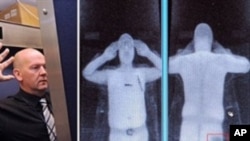Britain has introduced body scanners this week at airports in London and Manchester. The new devices are a response to the failed bombing of an American Airliner en route to Detroit on Christmas Day.
The body scanners were installed at Heathrow airport in London and in Manchester, Britain's second-largest city. Aviation specialist Chris Yates says they are not the only solution to Britain's airport security problems.
"Body scanners are one answer, but not by any means the only answer," Chris said. "There are other issues at play here that need to be addressed as well with other types of technology."
The body scanners can see through clothing to determine whether a person is hiding something. Their use has been criticized by civil-rights campaigners who claim they violate privacy.
Parliament Member Ben Wallace used to work for a scanning company, Qinetiq, says that concern has already been addressed.
"I think it is a red herring, privacy," Wallace said. "There is software that has been invented already that would insert red triangles over different parts of the body and that is a software that works on top of a scanned image, so if anything was there it would be picked up, but the viewer of the screen does not see much detail."
Another security measure the British government is considering is passenger profiling. Wallace says while people from countries considered high-risk will be more closely looked at, profiling is about more than nationality.
"There are lots of other factors that make up a profile," Wallace said. "It could be where you are traveling from. It could be your travel patterns in the past. It could be how you paid for your ticket - did you just rocket up by cash; did you pay on somebody else's credit card? It could be whether you have a criminal record in the past. It could be how you behave at check in. All those things are about profiling."
Wallace says, in the end, security is only as good as the personnel.
"Unless we invest in the people and the training and make sure that we are constantly supervising that, you will still have lots of people getting on planes with things they should not and it will only take one determined terrorist to be lucky once," Wallace said.
Another new technology being developed would identify liquids. A 2006 plot to blow up aircraft traveling from London to the U.S. and Canada led to the ban of many liquids on planes.
Arnab Basu runs a company that produces a machine that scans liquids.
"We can tell difference between a benign and a dangerous liquid within 25 seconds, completely non-invasively and we can do liquid identification in bottles, glass bottles, colored bottles, opaque bottles, metal containers, metal cans so in a whole range of containers without having to sample or open the container itself," Basu said. "
The British government says more scanners will be installed later this year, and all airports in Britain will introduce explosive trace detection devices by the end of the year.
New Body Scanners at Work In British Airports

Body scanners are viewed by many as an invasive technology, which amounts to a virtual strip search. They reveal graphic images of passengers' bodies, including medical details like evidence of mastectomy and colostomy bags. Britons call it a breach of child protection laws which ban the creation of indecent images of children.



